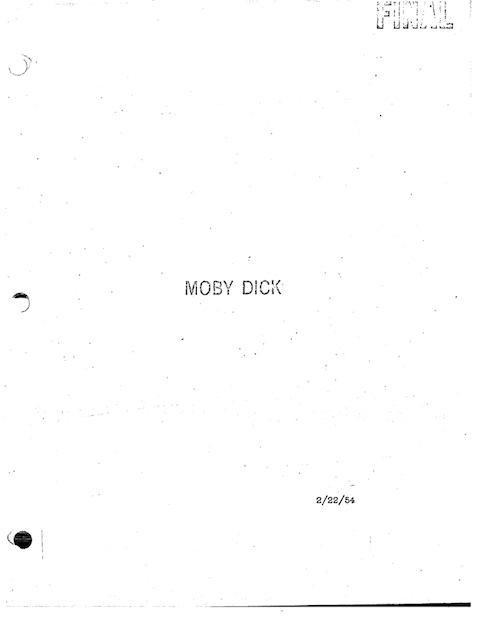
Ray Bradbury, unlike many novelists who choose to reside in Southern California, didn’t support his fiction-writing career by taking screenplay work. With the likes of The Martian Chronicles and Fahrenheit 451 to his name, he didn’t need to, not that it stopped him from adapting certain stories of his own for television and the movies. Only once did the prolific Bradbury undertake to write a screenplay based upon a book he didn’t write. But oh, what a book: Herman Melville’s Moby-Dick, turned into the John Huston-directed 1956 film of almost the same name. Though ultimately stormy — working with Huston, even in the best of times and for the brightest of writers, tended to become an ordeal — the collaboration began auspiciously, with the writer an avowed fan of the filmmaker, and the filmmaker an avowed fan of the writer. Yet neither, ironically, had much time for the Melville novel to which they had dedicated their efforts.
“Have you tried to read that novel?” Bradbury asks his audience in the clip just above. “Oh my god! John Huston didn’t know any more about it than I did. He wanted to play Ahab. Give him a harpoon, and he would’ve done it.” Working on the script in Ireland, Bradbury spent “eight long months of agonizing work, subconscious work,” all of which prepared him for the next decisive moment in this particular writing process: “I got out of bed one morning in London, looked in the mirror, and said, ‘I am Herman Melville!’ I sat down at the typewriter, and in eight hours of passionate, red-hot writing, I finished the screenplay of Moby Dick, and I ran across London, I threw the script in John Huston’s lap, and said, ‘There! It’s done!’ He read it and said, ‘My god, what happened?’ I said, ‘Behold: Herman Melville.’ ”
You can now read the fruits of this act of artistic channeling in a new edition from Subterranean Press featuring an essay by William Touponce, director of the Center for Ray Bradbury Studies at Indiana University-Purdue University Indianapolis. Cinephilia and Beyond has more, including a link to a PDF of Bradbury’s original final script.
Related Content:
Jean-Paul Sartre Writes a Script for John Huston’s Film on Freud (1958)
Ray Bradbury Gives 12 Pieces of Writing Advice to Young Authors (2001)
Ray Bradbury: Literature is the Safety Valve of Civilization
Colin Marshall hosts and produces Notebook on Cities and Culture and writes essays on cities, Asia, film, literature, and aesthetics. He’s at work on a book about Los Angeles, A Los Angeles Primer. Follow him on Twitter at @colinmarshall or on his brand new Facebook page.



Hello,nRay Bradbury wrote about these painful months in a collection of stories entitled “Green Shadows, White Whale.” Just thought i’d let you knowu2026 ;-)
After I saw this movie, I read the book. I loved the book, but I was a little disappointed. All the best lines weren’t in it. All the best lines were Bradbury.
master. Ray Bradbury. — Babu00e1.
For Bradbury to insult the greatest American novel when all he produced is pulp read by high-school er only underscores Melville’s achievement
Bradbury and Huston both lived in Ireland for a time and filmed MOBY DICK mostly in Youghal, a fishing port about fifty miles east of where I live. Bradbury wrote a whole collection of Irish stories, my favorite being THE ANTHEM SPRINTERS, about the nightly race by Irish movie patrons to get out of the Movie theater before the national anthem was played! Not very patriotic…
Yes it’s a great novel but there’s way too many passages about the whales and whaling. Whoever criticized Bradbury — you’re an idiot! He distilled the book and kept all the good stuff… Duh!!
O Mickey, poor lil Mickey. My copy of Moby Dick is dogeared, notated, curled and unfurled. All Bradbury was saying was that he finally got the spirit of the thing and did the truly impossible by writing a damned fine film script from the huge masterwork of a genius. Father Mapple’s sermon alone, shipmate, is worth the watching. You’re taking it all too seriously, you sound like a snob and a peabrain of a literay critic. You belong on the dock with that little old bearded lady in a bonnet waving good bye to the real men aboard the Pequod. Blast ye and your fool notions. And Bradbury himself wrote some wonderful sci fi fantasy in his day. Run along now lil boy and eat your soggy cornflakes. You don’t know shit for brains.
Regarding your complaint, Brad, “there’s way too many passages about the whales and whaling”: there exists a longstanding acknowledgment that Melville’s several chapters about the business of whaling and esp cetology, much of which is faulty science, are not necessary to the main, imaginative narrative of Ahab, Moby Dick and the Pequod. We get it. So it’s fine to skip these chapters and read the story.